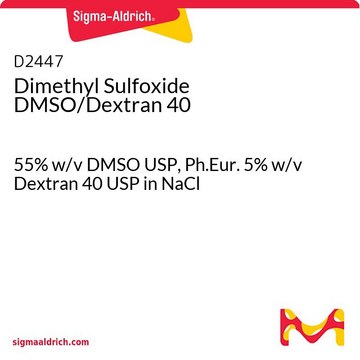D1435
Dimethyl sulfoxide
meets EP testing specifications, meets USP testing specifications
Synonym(s):
DMSO
About This Item
Recommended Products
Agency
meets EP testing specifications
meets USP testing specifications
Quality Level
vapor density
2.7 (vs air)
vapor pressure
0.42 mmHg ( 20 °C)
Assay
≥99.5%
form
liquid
autoignition temp.
573 °F
expl. lim.
42 %, 63 °F
technique(s)
cryopreservation: suitable
impurities
≤0.1% water (Karl Fischer, USP)
≤0.2% water (Karl Fischer, EP)
color
colorless
refractive index
n20/D 1.478-1.479
n20/D 1.479 (lit.)
bp
189 °C (lit.)
mp
16-19 °C (lit.)
solubility
H2O: miscible (completely)
density
1.100-1.104 g/mL at 25 °C (relative density (EP))
1.10 g/mL (lit.)
UV absorption
λ: 285 nm Amax: ≤0.20
λ: 295 nm Amax: ≤0.20
SMILES string
CS(C)=O
InChI
1S/C2H6OS/c1-4(2)3/h1-2H3
InChI key
IAZDPXIOMUYVGZ-UHFFFAOYSA-N
Looking for similar products? Visit Product Comparison Guide
Application
- for the dissolution of tetramethylrhodamine dye, which is used as fluorophore for fluorescence in- situ hybridization (FISH) experiments
- as a control in indirect immunofluorescent assay (IFA) of swine testicular (ST) cells
- for the suspension and separation of buccal cells
- a polar aprotic solvent used in polymerase chain reactions (PCR) and as a cryoprotectant vitrification agent for the preservation of cells, tissues and organs.
Biochem/physiol Actions
Caution
Other Notes
Dimethyl Sulfoxide Miscibility/Immiscibility Table
related product
Storage Class Code
10 - Combustible liquids
WGK
WGK 1
Flash Point(F)
188.6 °F - closed cup
Flash Point(C)
87 °C - closed cup
Personal Protective Equipment
Choose from one of the most recent versions:
Already Own This Product?
Find documentation for the products that you have recently purchased in the Document Library.
Customers Also Viewed
Articles
Hepatocytes are epithelial cells found in the liver. They perform important functions, such as helping to detoxify blood, and to synthesize transport proteins, such as lipoprotein, albumin and transferrin. Primary and secondary cultures of hepatocytes are useful for studying the mechanisms of liver regeneration and differentiation.
Our team of scientists has experience in all areas of research including Life Science, Material Science, Chemical Synthesis, Chromatography, Analytical and many others.
Contact Technical Service




